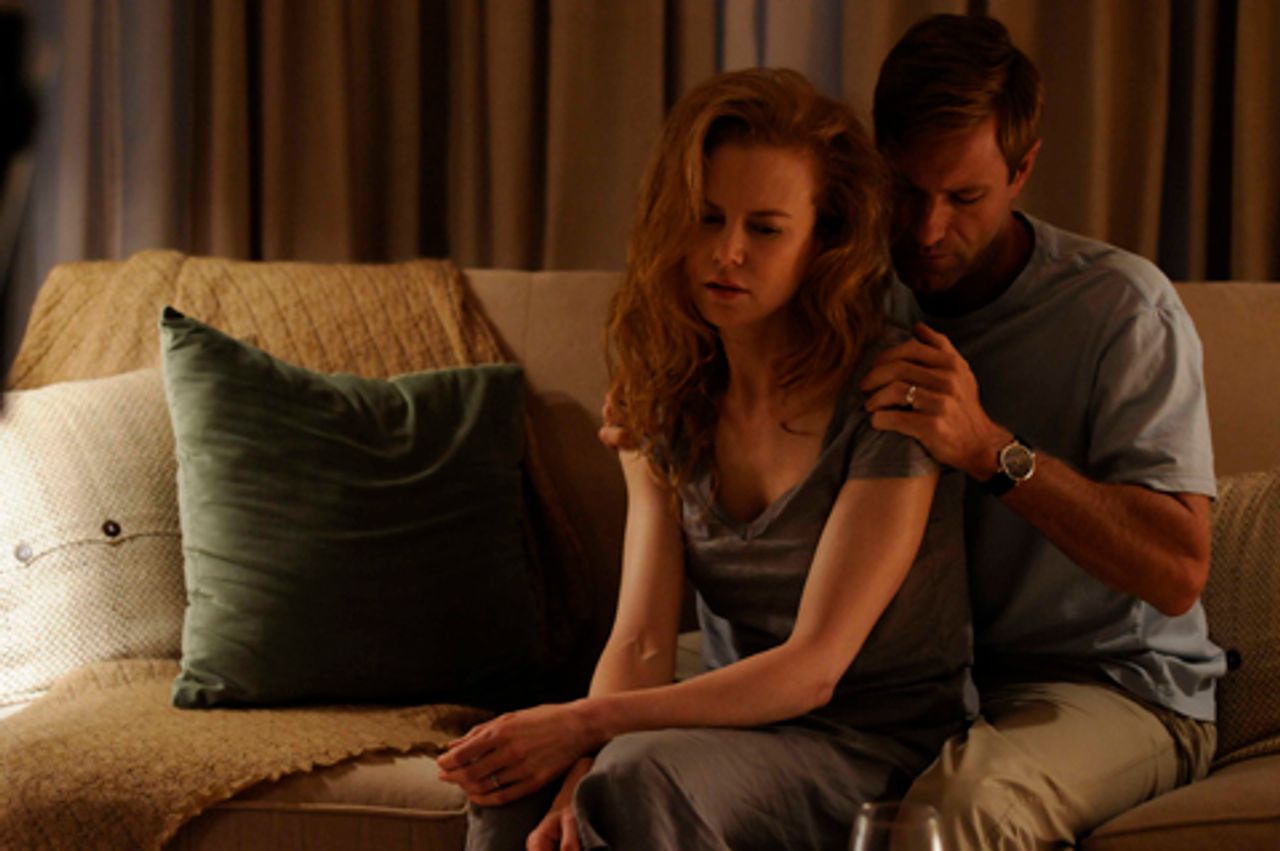Rabbit Hole is the third film from director John Cameron Mitchell (Hedwig and the Angry Inch, Shortbus) and an adaptation of American playwright David Lindsay-Abaire’s Pulitzer Prize-winning drama of the same name. While it may not break much new ground, Mitchell’s film treats the story of a family dealing with the death of a child with considerable honesty and sensitivity.
 Rabbit Hole
Rabbit HoleEight months after the tragic death of their young son Danny, who was struck by a car in front of their home, Becca and Howie Corbett (Nicole Kidman and Aaron Eckhart) are struggling to put their lives back together.
Becca no longer works and can’t bear the constant reminder of the loss of her child at home. She begins to remove his drawings from the walls and packs up his belongings to move them to the basement. This leaves Howie, who tries unsuccessfully to carry on with his life as he did before the accident, enraged. He accuses his wife of trying to “erase” their son’s memory.
The couple attends the weekly meetings of a support group, but the constant talk of God and religion leaves them cold. When one couple says their child died because “God needed another angel,” Becca bristles, remarking, “Why not just make another one? He’s God, right?” She eventually quits the group, leaving Howie to attend meetings on his own.
One day, Becca notices Jason (Miles Teller), the teenage driver of the car that struck Danny, in the window of a school bus. She follows the bus, waiting to discover Jason’s stop. After the boy notices he is being followed and confronts her, the two begin to meet regularly in a nearby park to discuss the accident.
These scenes between Becca and Jason are among the more moving in Rabbit Hole. The young teenage boy carries a great deal of guilt with him. In playing over the events in his mind, Jason worries he may have been driving too fast, but only by as little as one mile per hour over the speed limit. In reality, he did nothing wrong.
In these scenes, more than anywhere else in the film, one gets the sense that this was truly an accident. It wasn’t anyone’s fault, and yet the loss is there and the anger and the guilt are left to be dealt with. Above all, there’s no one who can be made to “pay” for this tragedy and nor should there be. There are healthy sentiments at work here.
Rabbit Hole, although not directly, comes out in opposition to the law-and-order mentality, which insists that every social tragedy must end up with someone behind bars—if possible, for a very long time—or that individuals have the right to revenge and that revenge represents “closure” or healing.
Having said that, the filmmakers are also honest enough not to depict forgiveness or understanding as a simple matter. While Becca is more forgiving of Jason, Howie lashes out at the boy in their only meeting. While he comes to regret it later, the filmmakers do not make him out a villain. Understanding does not come as easily to him as it did to Becca. His anger is never made out to be illegitimate. The filmmakers would prefer their viewers understand the characters, rather than judge them or take sides in the couple’s arguing.
The weight of the tragedy at Rabbit Hole’s center is always felt. One recalls a moving scene in which all of Danny’s belongings are collected in a corner of the Corbetts’ basement. The camera lingers on the objects as Becca and her mother take a moment to consider them. In this brief instant, Mitchell is able to communicate well the tragedy of a life cut so short. Everything the boy left behind fits into one corner of one room. His was a life which had not yet been lived.
For the most part, the film is able to achieve an emotional resonance that is not forced but genuinely felt. It is intelligently made and performed. Nicole Kidman has received the most attention, earning the actress an Oscar nomination, but the performances by Aaron Eckhart and Miles Teller are also strong.
Some portions of the film seem predictable, in particular a subplot in which Howie considers having an affair with a woman from his group therapy sessions, but other moments are quite surprising. That there is a certain amount of humor in the film is also welcome.
It is difficult to know, by the end of the film, where Becca and Howie will end up. They continue to struggle, they do their best, but there is also a sense that they are very much on their own. The filmmakers have explored, with some success, the enormous challenges they face.
